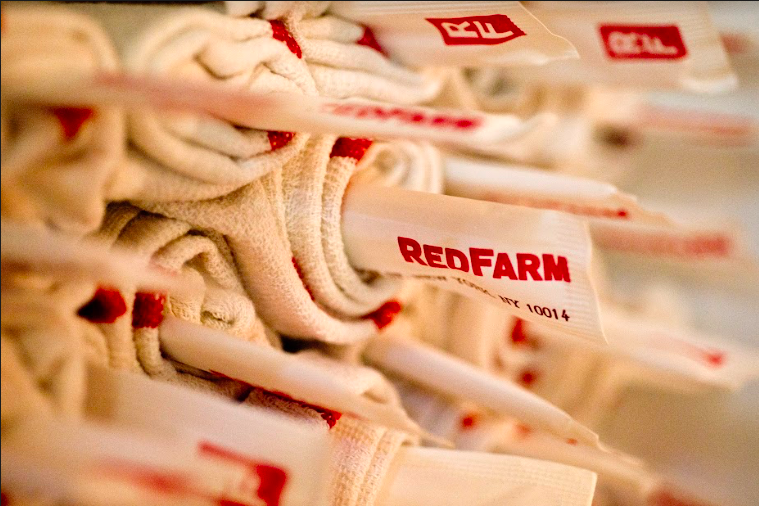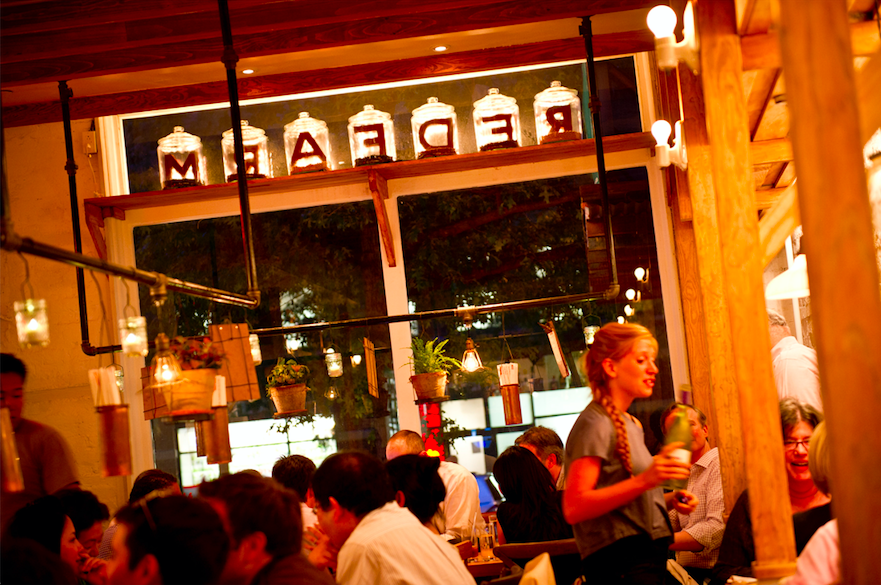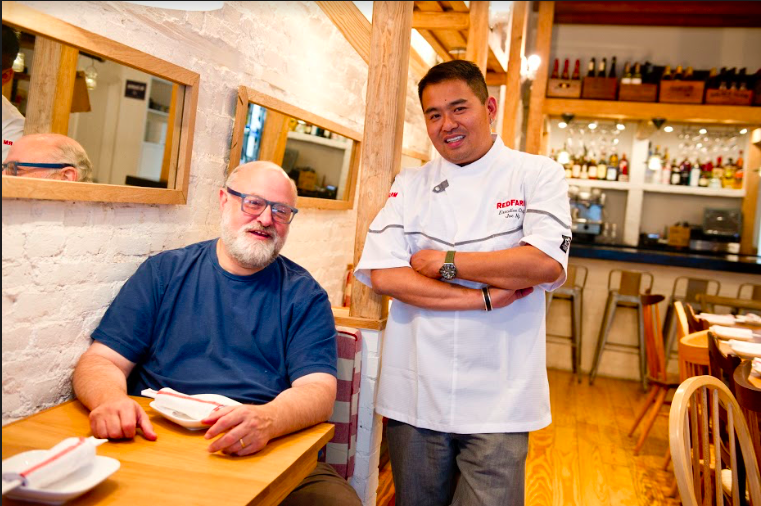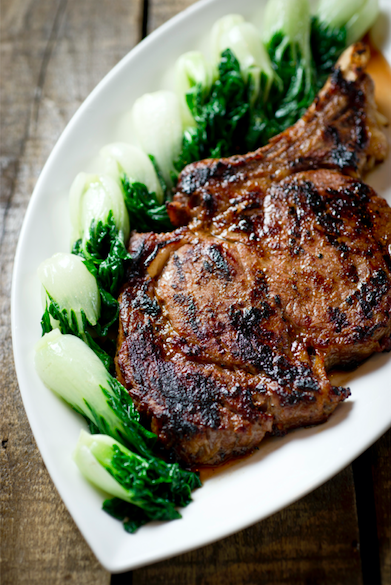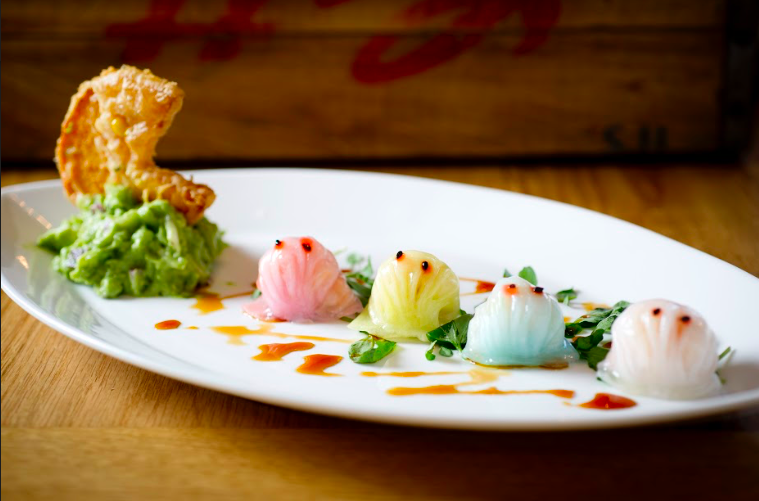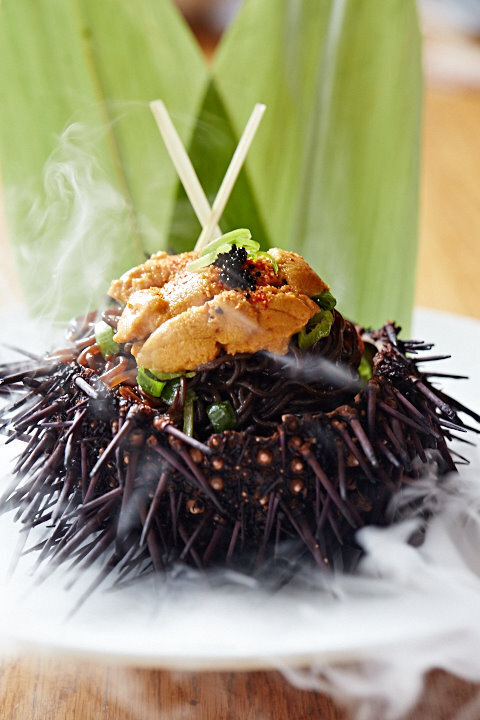Restaurateur Ed Schoenfeld
We took a moment to chat with the founder of Red Farm, Ed Schoenfeld. Truth be known, the guy is a walking encyclopedia of the Chinese food world here in NYC. We spoke with Ed to better understand how he became not the only man he is today, but the legend as well.
LR: As a New York native with a Hungarian/Jewish background, how did you even get into the world of Chinese food?
I grew up in a fairly intellectual Brooklyn household and attended an academically focused private school. However from the time I was a teenager I was very interested in cooking and by the time I got to college I decided that I wanted pursue a career in the food world. I started to study Chinese cooking because it was something that I experienced all the time. If you grew up the way I did in New York and were part of a Jewish family that wasn’t religious, it was normal to go out for Chinese food. Chinese cooking was exotic, tasty, accessible, and local, and it was the place you went to eat shellfish and pork: the forbidden foods of my forefathers. My family wasn’t kosher, but someplace back there, someone was, so it always felt a little special to eat spare ribs and lobster and shrimp at our local Chinese restaurant. In my family the joke was that ham and bacon were everyday fare, but somehow a pork chop was NEVER on the menu.
LR: Yeah here in New York you have so many different kinds of foods, all of which really prove to be segues into those different cultures. That being said, that makes you rooted in Chinese culture in ways that a lot of people aren’t.
In my particular instance, I started to teach myself how to cook as a teenager and soon thereafter decided to take cooking lessons. For fun I chose to study with Grace Zia Chu, a lady who was a famous Chinese cooking teacher in NYC. Madame Grace was from a wealthy Shanghai family and had attended college in the US. After graduation she went back to China and married. Her husband was very good friends with Chiang Kai Shek, the head of the Chinese government, who appointed him China’s ambassador to Moscow and it became Grace’s job to run the Chinese Embassy in Moscow. As you might imagine she ran a grand building with servants and employees and she certainly didn't cook people’s dinner.
After living in Moscow for many years, the Communists took over China (in 1949), which caused Grace’s husband to lose his ambassadorship, but before doing so, he was able to get his wife a diplomatic passport that enabled her to immigrate to the United States. Grace brought her love for “Mandarin”, northern style Chinese cooking, with her to NYC, and it wasn’t long before Grace decided to build a new NYC life for herself as a teacher of Chinese cooking and food culture. She started giving classes in ‘Mandarin’ Chinese cooking at her apartment on NY’s Upper West Side, and became one of the most important Chinese cooking teachers in the US. She also helped to start Chinese cooking classes at NYC’s China Institute. Soon items like Hot and Sour Soup, Pan-fried Dumplings and Moo Shu Pork became a part of our everyday experience of Chinese cooking.
Because of her elite and educated background Grace didn’t have the culinary chops or knowledge of a top professional masterchef, since as the head of an embassy she had professional chefs cooking for her and never had to learn the tricks that a fine professional chef would know. In order to learn an even higher level of craft I started setting up Chinese banquets. I approached the top chefs in the industry and asked them to make special multi-course highly decorated banquets for me. It was through these relationships that I became exposed to some of the highest level Chinese cooking and was able to get a truly special education and learn about the best of the best.
To make things very clear, I’m someone who wanted to become a food expert as a teenager and was lucky enough to get a great culinary education at a very young age. For years now I’ve had a reputation as a uniquely New York character, who somehow possesses an encyclopedic knowledge of fine Chinese cooking.
Since 1973 I’ve been imagining and running some of Manhattan’s most delicious and successful Chinese restaurants. Over the years I’ve imagined and set up over 50 restaurants of various kinds (many of them Chinese), and even though I feel like a lively 33 year old guy, I’m actually twice that age and frequently mentioned as a grand old man of the business.
LR: Can you tell us a little more about Red Farm and your partner, chef Joe Ng?
At Red Farm we search out and use top quality seasonal products and prepare them with a creative approach that’s extremely craft driven. My partner, Joe Ng, is a GREAT dim sum chef. I don’t say that as his partner, I say that as someone who travels and eats all over and who cooks every single day. I appreciate Joe for his excellent skills and ability. Try a shrimp dumpling in our restaurant. The skin is so thin that you can see through it. If there is a green or red vegetable inside you can tell from the outside. If you leave one of our cooked dumplings uncovered for 10 minutes its skin will still be supple and delicious not hard and dry. Joe is unusually talented and imaginative, and makes in the area of 1,000 different dumpling shapes. He loves to craft dumplings in the shape of animals. We serve shrimp dumplings that look like Pac Man and ghosts, and we offer crispy duck and crab dumplings that resemble skate fish: they have little crab shell tails and seem to be swimming around a pool of curry. Our spring rolls are shaped like flowers. Joe’s craft is imaginative, finely wrought, and most importantly it’s always extremely delicious.
LR: How did you and Joe meet?
I met Joe about 15 years ago in Brooklyn where I was living at the time and where he was working as a head dim sum chef at a restaurant on 18th Ave. His cooking had created a ruckus in the Chinese food community and a friend told me about his restaurant. I started going there all the time and eventually we became friends. I introduced him to the world outside of Chinese restaurants in Chinatowns. Eventually we did a project together when I was asked to set up the food for a new spot called Chinatown Brasserie. I placed him there as the head Dim Sum Chef and eventually he became the Executive Chef as well, learning how to oversee wok and BBQ chefs as well as a dim sum team. Joe’s remarkable work consistently demonstrates his high levels of craftsmanship, creativity and a great understanding of how to create ‘delicious’.
LR: What is it like working with another creative mind in the culinary space?
Every relationship is different and Joe has a very strong vision of who he is and what he wants to do. Menus and recipes are certainly filtered through me but I have found that the best way to work with Joe is to let him do his thing and then discuss it as necessary. Joe is strong-minded about what he wants to do but he’s also very good at listening and taking suggestions. I let Joe be creative in any way that makes sense to him, and if it’s appropriate, I give feedback. Joe’s a master and he usually gets things right the first time. I often let him know what vegetables are in season at the moment and enjoy introducing him to new ingredients that may not be familiar to him. For instance I introduced him to pastrami and truffles, both of which play an important role at RedFarm & Decoy.
LR: In your experience what makes for good Chinese food?
The first thing a top Chinese chef thinks about is how to create great texture. Then it’s about creating balance and variety: the goal is to have a balance of textures, colors, flavors, smells, and types of ingredients. Our perspective always includes curating our ingredients. It’s one of the things that’s distinctive about Red Farm.
Talking about Red Farm’s name, ‘red’ is generically Asian and ‘farm’ is about the whole idea of seasonality and local products. We’re in the Chinese food business and that means that some of the foods we must use grow in different parts of the world and can’t be local. But they still can be excellent. Do we use truffles when they are in season? Sure. Do they come from France? Yes. Are they local? Obviously not. We cook with chanterelles too. Why? Because they are really delicious and we love them, and because even though they are not often found in other Chinese restaurants they fit in perfectly with our cooking. Go to our restaurant and order a small plate of wontons. They are filled with beef and shrimp. The beef is marinated in a Cantonese fashion and it’s cut into little cubes: it has an excellent mouth feel. The wontons are served with the most delicious mushroom ragout that features fresh chanterelles, dry shiitakes, and whatever other mushrooms we have that are available right then. Boy, does that little mushroom ragout kick the dish up a notch and it really tastes excellent! This is a dish that is typically ‘Joe-style’. But it’s also the sort of plate that one might expect to see in an Italian restaurant with the wontons being called ravioli. But in Joe’s hands it’s inspired Chinese food. His work is special. For someone like me who’s deeply into the details of this world, my appreciation is substantial.
LR: At LUCKYRICE we like to say that “if we are what we eat, then we’re all part Asian.” After cooking and eating Chinese for so many years would you say that you feel Chinese in a certain sense?
No I feel Jewish. I’m a Jewish guy in New York City, but I’ve been around Chinese people all my life. We’re all on the same planet and I think I have a good sense of Chinese culture and the Chinese world and the context to put it in. I am what I am: a Caucasian guy. But hey, these days we all take DNA tests right? You think you're Chinese and then you discover you’re part Moroccan and Aztec and you go what the ….!
I certainly understand what it's like to interact with Chinese people, even on a non-verbal level. Being a white NYC guy in the Chinese food business helps me understand how to cater to a New York customer. We’re selling sea bass, steak, dumplings and noodles and we’re not selling a lot of the esoteric part of the Chinese kitchen. I’m sure we know how to make those dishes but bird’s nest soup is not the business we’re in. We’re selling particularly delicious food that our contemporary American audience wants to eat and understands, and Americans have a very big appetite for Chinese food and dine on it often. We are literally purveyors of ‘a better egg roll’, not to mention great dumplings and steak!


